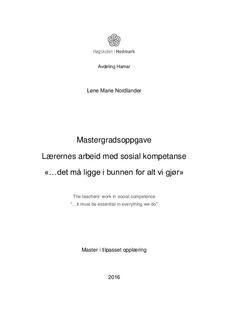Lærernes arbeid med sosial kompetanse «…det må ligge i bunnen for alt vi gjør»
Master thesis
Permanent lenke
http://hdl.handle.net/11250/2497277Utgivelsesdato
2016Metadata
Vis full innførselSammendrag
Norsk:
«Lærernes arbeid med sosial kompetanse “…det må ligge i bunnen for alt vi gjør”», er en mastergradsoppgave i tilpasset opplæring ved Høgskolen i Hedmark. Bakgrunnen for oppgaven er at skolens styringsdokumenter vektlegger skolens ansvar for utviklingen av elevenes sosiale kompetanse, og det er et sentralt tema i diskusjonen om fremtidens skole. Sosial kompetanse er vesentlig for elevenes liv, både når det gjelder å mestre skolehverdagen og senere i familie- og arbeidsliv. Det er derfor av stor betydning at lærere skaper gode forutsetninger for at sosial kompetanse skal læres og utvikles både med tanke på nåtid og fremtid. For å lære mer om hvordan jeg kan jobbe med dette, er oppgavens problemstilling som følger: Hvordan arbeider lærerne for å fremme elevenes sosiale kompetanse? For å få svar på problemstillingen, har jeg benyttet meg av det kvalitative forskningsintervjuet og intervjuet fire kontaktlærere om hvordan de arbeider for å fremme elevenes sosiale kompetanse.
Informantene fortalte at de vektla sosial kompetanse sterkt, og flere sa de hadde fokus på det hele tiden ved at det var en del av hverdagen. De tilpasset den sosiale opplæringen ved å ta utgangspunkt i hver enkelt elevs forutsetninger, og brukte underveisevaluering for å hjelpe elevene videre i læringsprosessen. De organiserte den sosiale læringen hovedsakelig i full klasse, i tillegg til gruppetiltak for elever med ekstra behov. Informantene la vekt på virkelighetsnære læringssituasjoner, og lot elevene få arbeide med sosiale ferdigheter både ved samtale og refleksjon, men også gjennom erfaring og praktisk øving. De brukte ferdige programmer i ulik grad, flere i kombinasjon med det de gjorde på eget initiativ. De fortalte om varierte måter å utvikle elevenes sosiale kompetanse, og arbeidsmetoder og aktiviteter de tok opp var samtaler og refleksjon, mål og regler, positive forventninger og bevisstgjøring av egen kompetanse, rollespill, loggbok, læringspartner og klassens time. De tok også opp trivselsledere, utviklingssamtaler, tipsplakater «stolros», lagspill, «storklasser», konflikthåndteringskurs, og turer og aktiviteter utenfor skolen.
Informantene ga inntrykk av at samarbeidet med kollegaer og ledelse om sosial opplæring kunne det vært mer av, men de samarbeidet godt med skolens støttesystemer og med hjemmet om sosial kompetanse. Alle vektla gode lærer-elev, og elev-elev relasjoner, samt et godt læringsmiljø i arbeidet med sosial kompetanse. English:
«The teachers’ work in social competence “…it must be essential in everything we do”», is a master’s thesis in adaptive education at Hedmark University College. The background for the study is that the school’s statutory documents are emphasizing the school’s responsibility for the development of the pupils’ social competence. It is also a central topic in the discussion of how the future school is going to be. Social competence is significant in the lives of the pupils, both in terms of mastering the school day, and later in family and work life. Therefore, it’s of great importance that teachers create conditions in which social competence can be learnt and developed considering both the present and the future. In order to learn more about this, the thesis statement is as follows: How do teachers work in order to promote the pupils’ social competence? So as to answer the thesis statement, I have used the qualitative research interview and interviewed four contact teachers about how they work in order to promote the pupils’ social competence.
The informants told that they emphasized social competence strongly, and several said that they had a constant focus on it and that it was a part of the school day. They adapted the social education based on each pupil’s preconditions, and used formative assessment in order to help the pupils onwards in their learning process. They organized the social education mainly in full class, in addition to group measures for pupils with special needs. The informants attached importance to realistic learning situations, and let the pupils practice the social skills both in conversations and reflections, as well as through experience and practical training. They used programs to different degrees, several combined with what they did on their own initiatives. They told that they used a variety of ways to develop the pupils’ social competence, and working methods and activities they mentioned were conversations and reflections, aims and rules, positive expectations and awareness raising about own competence, roleplay, logbook, learning partner and “the class’ lesson”. They also brought up “wellbeing leaders”, development talks, tip posters, “chair praise”, team games, “big classes”, conflict management course, and trips and activities outside school. The informants gave the impression that the collaboration between the teachers and the leadership about social education could be more present, but they collaborated well with the school’s support system and had a good parental cooperation. Everyone emphasized good teacher-pupil and pupil-pupil relationships, as well as a good learning environment in the social education.
Beskrivelse
Mastergradsoppgave i tilpasset opplæring, Avdeling for lærerutdanning og naturvitenskap, Høgskolen i Hedmark, 2016.
